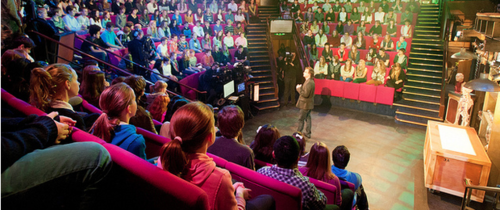Festive science – the RI christmas lectures
You’d be forgiven for thinking that Christmas doesn’t really have much to do with science. Whilst you’re tucking into your turkey, unwrapping your presents, and conveniently forgetting the mountains of work due in for week 1, science is probably not at the forefront of your mind.
However, there is one Christmas tradition that is both fantastically festive, and superbly scientific. The Royal Institution Christmas Lectures are an ongoing tradition that started back in 1825 with John Millington running a series of lectures on natural philosophy, which we call physics today. The idea of the lectures was to make up for the lack of organized science education for young people, and to present scientific ideas to them in an exciting, yet informative way.
Since the advent of the lectures, many world famous scientists have taken their own series, including David Attenborough, Carl Sagan and Richard Dawkins. Michael Faraday, one of the brains behind the original concept, led 19 series of Christmas lectures himself. They have been televised every year since 1966, opening the lectures up to a much wider audience. Today, the topics for the Christmas Lectures are far more specialized than they were back in 1825, and this year’s series is called ‘The Modern Alchemist’. Led by Peter Wothers, a Chemistry professor at The University of Cambridge, the series contains three lectures, each one focusing on an ancient element of life: air, water and earth respectively, and according to the Royal Institution’s website, ‘lots of fire.’
Wothers’ lectures will examine the evolution of our understanding of these three elements. He will also look at how the balance of chemicals on our planet is so crucial to our existence. In his air lecture, he explains how oxygen, in the form of a diatomic molecule, is one of the most important elements for life. However, adding another oxygen atom to this molecule creates ozone, a gas that is toxic in large quantities. Nitrogen, a normally unreactive gas, does very little on its own, yet is a key component of life and the air we breathe. Wothers explores how the individual elements of air each come together to make our planet habitable and life on earth possible.
Next up is water, and Wothers answers the question why two hydrogen and oxygen atoms make an essential molecule that facilitates life, yet disconnecting the atoms into a mixture creates a gas that is highly explosive when exposed to a spark. The energy released in this reaction is huge, and the lecture looks at the ways we have of harnessing it, and why the concept of energy is so crucial to our understanding of chemistry.
The third and final lecture considers Earth, and begins with the ancient belief that metals grew inside rocks, maturing over time into different metals. The lecture explores how oxidation of metals causes much of this ‘maturing’ process, and goes on to consider the alchemy humans can artificially create today. In a way, today’s scientists are alchemists – through modern techniques, we are able to piece together elements by adding subatomic particles, a feat likened to the ancient belief that gold can be made from lead. By understanding the properties of the materials at our disposal, we can extend our knowledge to new, exotic substances that ancient alchemists could only dream of.
The Christmas lectures are always a fun and exciting look into the world of science, and this year promises nothing less. With a human periodic table, fire breathing tricks and exploding balloons, the 2012 series will bring science to life, making chemistry both accessible and exciting to scientists and non-scientists alike. The lectures are being aired on the 26th, 27th and 28th December at 8pm on BBC4, so be sure to tune in to keep up the festive spirit with a great scientific tradition!

Comments